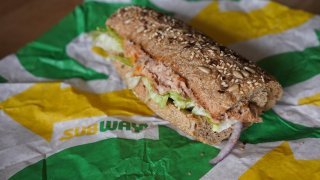
Subway’s chance to dodge lawsuits over its ongoing tuna sandwich debacle is sleeping with the fishes.
A federal judge ruled on July 7 that the sandwich chain can be sued for allegedly deceiving customers by describing its tuna products as made with "100% tuna."
As first reported by NBC News, Judge Jon Tigar of the United States District Court for the Northern District of California decided last Thursday in response to claims brought forth in 2021 by Karen Dhanowa and Nilima Amin, two residents of Oakland, California.
Subway has responded to these claims by saying any non-tuna product found in its tuna products would most likely be the result of cross-contamination while the sandwich is being prepared by staff.
Get New England news, weather forecasts and entertainment stories to your inbox. Sign up for NECN newsletters.
In a statement to TODAY, a Subway spokesperson said, “Subway serves 100% tuna. We are disappointed the Court felt it couldn’t dismiss the plaintiffs’ reckless and improper lawsuit at this stage. However, we are confident that Subway will prevail when the Court has an opportunity to consider all the evidence. To learn more about Subway’s real wild-caught tuna, please visit SubwayTunaFacts.com.”
In January 2021, Dhanowa and Amin accused Subway of selling customers tuna sandwiches that “partially or wholly lack tuna as an ingredient.” Dhanowa and Amin’s complaint claimed to represent customers of the franchise who purchased tuna sandwiches that “entirely lack any trace of tuna as a component, let alone the main or predominant ingredient.”
At the time, a Subway spokesperson told TODAY, “There simply is no truth to the allegations in the complaint that was filed in California. Subway delivers 100% cooked tuna to its restaurants, which is mixed with mayonnaise and used in freshly made sandwiches, wraps, and salads that are served to and enjoyed by our guests.”
U.S. & World
Amid the Dhanowa and Amin lawsuit, The New York Times sampled fish from three different Subway Los Angeles locations. According to the Times’ findings, the results showed there was “no amplifiable tuna DNA.”
In response to the report, Subway dug in its heels stating at the time that “there simply is no truth to the allegations” and that it would “vigorously defend itself” when it came to the claims, even going so far as to offer an "ITSREAL" deal on its tuna subs. The fast-food chain also went on the defensive with an informational website called SubwayTunaFacts.com. The site asserted that “Subway Tuna Is Real Tuna” and that it “uses wild-caught skipjack tuna regulated by the Food and Drug Administration (FDA).”
The site still claims that the tuna sandwich is “a favorite among sub lovers” and that its "tuna is and has always been high-quality premium, and 100% real.”
The height of the claims broke open a dam on Twitter, sparking conversations and comments on social media about Subway and its tuna products. Even singer Jessica Simpson (known by early aughts fans for sparking a debate on what qualifies as tuna) commented on the emerging claims.
"It’s OK @SUBWAY. It IS confusing," she tweeted in response to a TODAY article about the claims.
However, Judge Tigar’s ruling said the fishiness of Subway’s “100% tuna” claim can be misleading for unsuspecting customers.
“Although it is possible that Subway’s explanations are the correct ones, it is also possible that these allegations refer to ingredients that a reasonable consumer would not reasonably expect to find in a tuna product,” Tigar said.
This article first appeared on TODAY.com. More from TODAY:



